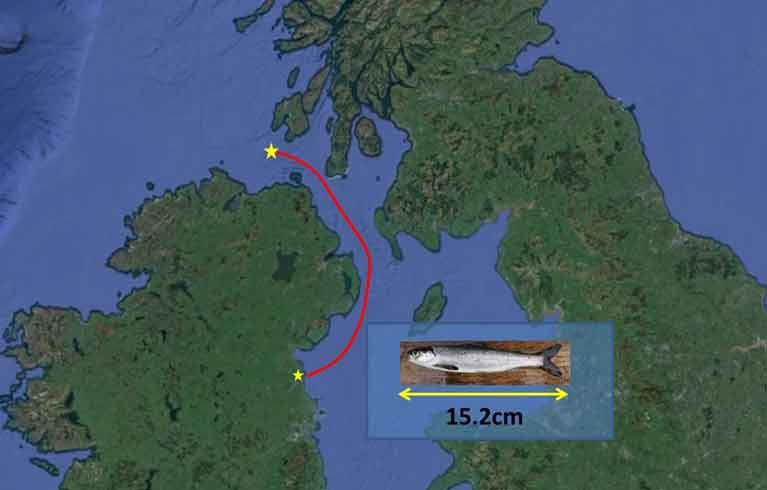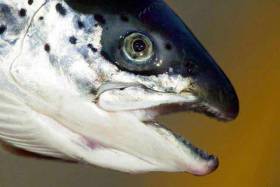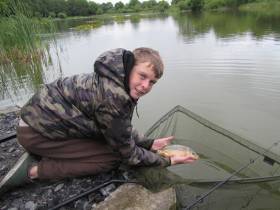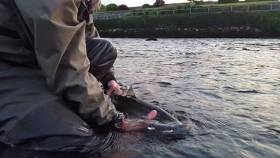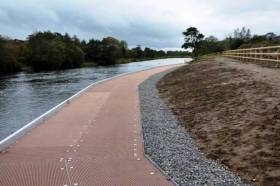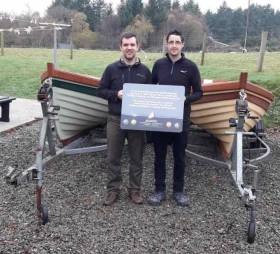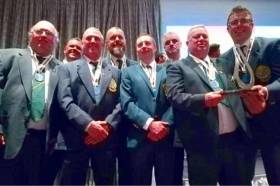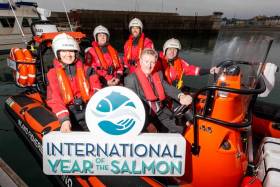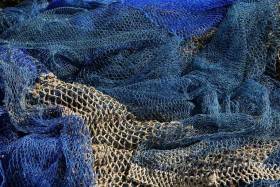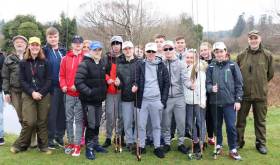Displaying items by tag: angling
New Evidence of Migration of Young Salmon Leaving Ireland
The route taken by young salmon (smolts) leaving the east coast of Ireland has been discovered for the first time. Inland Fisheries Ireland and Northern Ireland’s Agri-Food and Biosciences Institute have revealed findings which show young salmon leaving rivers on the eastern coast travelling northwards to leave the Irish Sea, rather than south and west to join salmon on the western coast. The research was carried out as part of the COMPASS project and funded by the EU European Regional Development Fund's Interreg VA programme.
The new evidence was established after researchers tagged salmon smolts with coded transmitting acoustic tags in the Castletown and Boyne rivers in County Louth during the spring of this year. Three of these tagged salmon were picked up on listening devices in the coastal seas as they travelled northwards out of the Irish Sea towards the Atlantic Ocean.
One of the smolts was recorded in Scottish waters, some 80 kilometres north of the Inishowen Peninsula. This smolt had travelled an estimated 250 kilometres in just over a month, one of the longest distances recorded for a salmon tracked at sea en route to its feeding grounds in the North Atlantic. Two more salmon smolts were tracked as far as receivers located off the Northern Ireland coast, further confirming the northward migration of the fish through the Irish Sea.
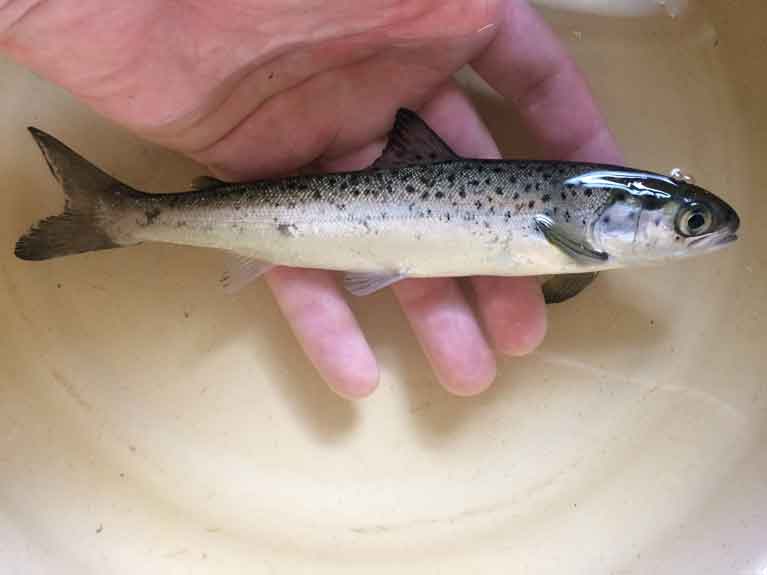 A salmon smolt
A salmon smolt
Until now, it was unknown if juvenile salmon leaving Ireland’s east coast rivers headed around the North or South coasts to get to their oceanic feeding grounds. These first three tracked fish took a northward route from rivers on the east coast to exit the Irish Sea. These salmon also moved offshore quickly, behaving very differently from sea trout, which remained closer to their spawning rivers and swam closer to the coast and river mouths.
The tagging work was carried out by scientists from Inland Fisheries Ireland (Dr James Barry) and AFBI (Dr Richard Kennedy) who tagged and analysed the movements of 130 salmon smolts as they left their rivers of birth in the spring of 2019. This work was supported by a local angling clubs, including The Dundalk and District Brown trout and Salmon Anglers, who helped to install fish traps which enabled the tagging and release of fish. A network of acoustic receivers were moored to the seabed along the coast from Drogheda to the northeast coast by researchers from IFI and AFBI, to track the tiny acoustic transmitters in the salmon as they migrated from the rivers to the open ocean.
This research is just one element of the COMPASS (Collaborative Oceanography and Monitoring for Protected Areas and Species) project, a transnational initiative which focuses on the coastal seas between Ireland and western Scotland. The project aims to deliver improved cross border environmental monitoring programmes, including research to support highly mobile protected species such as marine mammals, salmon and sea trout. This particular research package is investigating the success of wild salmon and sea trout as they migrate from river to sea, and examining where they travel to and how many of them survive before returning to Ireland to reproduce.
Commenting on the findings, Dr William Roche, Senior Research Officer at Inland Fisheries Ireland said: “As salmon populations are in decline across the northern hemisphere, we urgently need to establish their migration journey and identify any issues which may be negatively impacting survival along that route. This research marks an exciting milestone and it will play a critical role in supporting marine conservation efforts.”
Dr Cathal Gallagher, Head of Research and Development at Inland Fisheries Ireland said: “Salmon hatch in their native river, spend their juvenile life feeding in freshwater and prepare for their long sea migration before returning as adults, usually one year later to mate in their native river. Genetic analysis has shown this loyalty to their native river which can be traced back to the Ice Age.
The COMPASS project has for the first time identified the northward migration route of young salmon from some of Ireland’s east coast rivers, as they start their epic and dangerous journey to their feeding grounds in the North Atlantic Sea. Research results like these offer insights which will enable policymakers and managers to focus actions aimed at the protection and conservation of Ireland’s iconic salmon stocks, which have suffered considerable decline over the past decades. Inland Fisheries Ireland will continue in its research efforts, nationally and internationally, to support the conservation of our salmon stocks which are threatened by current and increasing threats posed by a changing environment.”
Dr Robert Rosell, Principal Scientific Officer for freshwater fish at AFBI said: These observations are an exciting first for long-distance tracking of individual young salmon at sea. We are now in a position to carry out follow up studies to find out much more. These results will optimise the placement of further detection equipment and add information, for instance on survival rates, for further releases of tagged fish. Now that we know where to look, advancing technology and longer battery life tags may soon give us not just the outward journey, but also detail of the routes taken by adult fish coming back to spawn.
€1 million in Funding for Angling Initiatives Fisheries & Conservation
Sean Canney TD, Minister with responsibility for inland fisheries, has today announced the recipients of €1 million in funding from Inland Fisheries Ireland. The grants will support fisheries conservation, protection and education initiatives and give the public greater access to fishing sites around the country.
The funding has been awarded to 25 projects in 16 counties, alongside two nationwide initiatives, and is made available by Inland Fisheries Ireland under its National Strategy for Angling Development (NSAD). Since 2016, the NSAD has supported 128 projects across the country with over two-thirds (69%) of projects completed to date with the remaining projects in progress.
This latest funding is granted through the Salmon and Sea Trout Rehabilitation, Conservation and Protection Fund (€894,850), NSAD Capital Grants Fund 2019 (€128,300) and the Midlands Fisheries Fund (€15,000). The funding call was oversubscribed with applications from community groups, angling clubs and local authorities all looking to improve and protect their local fisheries resource.
Announcing the fund recipients, Sean Canney TD said: “As Minister with responsibility for inland fisheries, I am delighted to make over €1 million available to projects across the country which will help us conserve, protect and develop a sustainable fisheries resource for all. The range of projects which we are supporting gives an insight into the diverse requirements of the fisheries resource as the demand for funding for fisheries projects continues across the country.
“Some of the projects receiving funding will focus on recovering valuable salmon and sea trout stocks while others will look to build infrastructure which will help those of all abilities access fishing. However, all projects have a commonality in that they will help deliver a sustainable inland fisheries and sea angling resource and in turn, help us realise the economic and social benefits which the fisheries resource offers to communities nationwide.”
Projects to receive funding include:
A research project to examine the potential decline in sea trout numbers in the Currane catchment in Kerry (€187,089).
Conservation works to help improve habitat for salmon on the Oily River, Co. Donegal (€25,176).
Support for the wheelchair accessible Lough Ree Angling Hub in Roscommon which will ensure fishing is accessible to people of all abilities (€50,000).
Support for the third phase of the River Easkey Angling Development Project in Sligo for the provision of stiles and footbridges at 32 fishing locations along the River Easkey (€33,300).
Construction of an approved fish pass to extend salmon migration on the Marty River, Co. Meath (€100,000).
(More detailed information is available in the Notes to Editor Section)
Dr Ciaran Byrne, CEO of Inland Fisheries Ireland said: “We are already partnering with over a hundred clubs and associations in the delivery of fisheries projects and today’s announcement sees a further investment in the future health of our fisheries resource. Those who were successful in securing funding include fishing clubs, community groups, sports clubs, tourism providers and local authorities. It was great to see recognition of the importance and potential of the resource from so many groups in our society and we look forward to working with them in delivering these projects for their communities.”
Funding Recipients 2019
Midlands Fisheries Fund
|
Project |
Location |
Description |
|
River Brosna Conservation Works - Mullingar Shamrocks GAA Club €15,000 |
Mullingar, Co. Westmeath |
This project will lead to an improvement in the bio-diversity in the river channel and the land bordering the river. |
NSAD Capital Grants Fund 2019
|
Project |
Location |
Description |
|
Killaloe Courthouse Feasibility Study – Tulla District & Coarse Angling Association €10,000 |
Killaloe, Co. Clare |
Study to assess the potential development of Killaloe Courthouse into a centre of excellence for angling on the Derg and Care. |
|
Abbotstown Lake Fishery Development Plan – Inland Fisheries Ireland €10,000 |
Abbotstown Lake, Sport Ireland HQ , Dublin 15 |
Development works to develop a fishery at the site, including stocking of the lake. |
|
River Easkey Angling Association Development Project Phase Three – River Easkey Angling Club €33,300 |
River Easkey, Co. Sligo |
Provision of stiles and footbridges at 32 locations along the River Easkey to give greater accessibly to fishing sites. This is the third phase of this project with earlier phases also supported by Inland Fisheries Ireland. |
|
Access For All Wheelchair Accessible Angling Centre – Lough Ree Angling Club €50,000 |
Lough Ree, Co. Roscommon |
Re-fitting an existing building to create a wheelchair accessible angling hub. A wheelchair accessible boat will also be provided by the angling club. |
|
Development of Slipway and Parking – Arvagh Angling Holidays €20,000 |
Lower Lake / Hollybank Lake, Arvagh, Co. Cavan |
Construction of a slipway and parking area to give improved access to the lake for boat angling. |
|
Arklow Riverwalk Habitat Restoration – Arklow Tidy Towns €5,000 |
Arklow, Co. Wicklow |
Improvement works at the riverside amenity in the town which will support bio-diversity in the river and along the river bank as well as improve access to angling. |
Salmon and Sea Trout Rehabilitation, Conservation and Protection Fund
|
Currane STAMP Project – Inland Fisheries Ireland €187,089 |
Currane Catchment, Co. Kerry |
Study to identify factors contributing to the decline in sea trout and identify measures which could revert this decline at this important angling destination. |
|
Salmon Conservation Limit Attainment 2019 to 2022 – Inland Fisheries Ireland €333,530 |
Nationwide |
This project will assess salmon stocks nationwide and will help identify which rivers have critically low numbers of salmon. The results of this research will inform the opening of rivers to salmon fishing. |
|
#CPRSavesFish Badges – Inland Fisheries Ireland €1,350 |
Nationwide |
Make promotional #CPRSavesFish badges available to anglers who are practising catch and release salmon. |
|
CCTV equipment – Inland Fisheries Ireland €8,683 |
River Slaney, Enniscorthy, Co. Wexford |
CCTV Equipment for a known salmon poaching hotspot in Enniscorthy town to support protection efforts. |
|
Behal’s Weir Stablisation Project – Inland Fisheries Ireland €30,000 |
Behal’s Weir, Kilmacow, Co. Kilkenny |
Following a recent flood which resulted in a portion of the weir washing away, this project will remove collapsed weir, stabilise the river bank and ensure improved passage of fish. |
|
Brett’s Weir Fish Pass Proposal – Inland Fisheries Ireland €55,000 |
Brett’s Weir, Co. Kilkenny |
Brett’s Weir currently acts as a partial barrier to the passage of Salmon in the River Nore. This project will design a shovel ready project for a fish pass to improve the passage of salmon up the river. |
|
Proposed Fergus Rehabilitation Plan – Ennis and District Anglers Association €5,000 |
River Fergus System, Co. Clare |
Survey of the Fergus System and preparation of a rehabilitation plan for it which will improve the habitat for salmon. |
|
River Dargle Fisheries Protection Project – Inland Fisheries Ireland €7,870 |
River Dargle, Bray, Co. Wicklow |
Provision of CCTV equipment to monitor a known salmon poaching hotspot on the River Dargle in Bray. |
|
Dublin Smart City Fish Sensors Project – Inland Fisheries Ireland €2,000 |
Dublin City |
A citizen science project which aims to use cameras, sensors and the internet to monitor fish movement as well as promote salmon conservation. This project will be part funded by Dublin City Council. |
|
River Boyne Catchment Management Programme – Inland Fisheries Ireland €100,000 |
Martry Weir, Co. Meath |
Construction of a fish pass at Martry Mill to facilitate migrating salmon on their journey. |
|
River Fane Enhancement – Dundalk Salmon Anglers €7,584 |
River Fane, Dundalk, Co. Louth |
Installation of fencing along 500 metres of river bank to prevent livestock entering the river and causing damage. This will improve the river habitat and salmon spawning beds. Includes three stiles to access the river. |
|
Fish Counter Upgrade & Housing – Inland Fisheries Ireland €40,000 |
River Liffey at Islandbridge, Dublin |
Upgrade to the fish counter facilities at Islandbridge which will support the management of salmon stocks. |
|
Bakery Weir Fish Passage Improvement Works – Inland Fisheries Ireland €56,000 |
Bakery Weir, Cahir, Co. Tipperary |
The Bakery Weir acts as a partial barrier to the passage of salmon in the River Suir. This project will carry out a study to help prepare for a fish pass at the site. |
|
Oily River Improvement Project – Charles Tindal €25,176 |
Oily River, Co. Donegal |
This project will assess potential works to repair an eroding river bank which will help improve habitat for salmon. |
|
Trawbreaga Bay – Cruinniú na n-Aibhneacha – Local Assessment of Small Coastal Streams Inishowen Rivers Trust €5,000 |
Trawbreaga, Co. Donegal |
This project will assess two coastal streams entering the bay and provide recommendations for measures to improve habitat and water quality for salmon and sea trout. |
|
Tarsaughan River Salmon Conservation Project – Shean Lodge Fishery €22,479 |
Tarsaughan River, Co. Mayo |
This river is currently eroding and has become shallow and not ideal as a salmon habitat. This project will assess potential works to repair the eroding river bank to improve the habitat. |
|
Surveillance CCTV System for Scarleigh Weir – Inland Fisheries Ireland €6,089 |
Scarleigh Weir, Co. Kerry |
Provision of CCTV equipment to monitor illegal poaching activity at Scartleigh Weir. |
|
Seamus the Salmon – Inland Fisheries Ireland €1,000 |
Custom house Quay, Cork & Southwest |
Creation of ‘Seamus the Salmon’ which will be made from stainless steel and filled with plastic gathered from beach clean-ups. Seamus will promote conservation and environmental protection and will be housed at the Custom House Quay in Cork and travel along the South-West of the country for promotional purposes. |
250 New Anglers Participate in Novice Dublin Fishing Programme
Over 250 young people from the Greater Dublin Area took part in the Dublin Angling Initiative, a novice fishing programme delivered by Inland Fisheries Ireland, during the summer. The initiative aims to promote, develop and improve angling among children and young people in the Greater Dublin Area.
Youth clubs, community groups and schools took part in the fishing programme which caters for anyone interested in angling and the outdoors, from the complete novice to the more advanced angler with exposure given to each of the different types of fishing (sea and freshwater fishing).
Young people from communities in Tallaght, Darndale and Blanchardstown tried the sport for the first time over the summer months; enjoying fishing lessons, fishing trips and family fishing days. In addition to practical fishing exercises, fishing presentations and tours provide an insight into fish, their habitat, conservation measures and even good local fishing spots!
Inland Fisheries Ireland’s Dublin Angling Initiative has operated in local communities for over 20 years with many young novices progressing to become skilled and experienced anglers who then join or establish fishing clubs themselves. This year, the Dublin Angling Initiative will extend its offering into the autumn season with national and secondary school groups invited to apply to the programme, alongside youth clubs, community groups and angling associations.
Brian Beckett, Inland Fisheries Ireland Director of the Eastern River Basin District said: “The Dublin Angling initiative introduces young people to fishing, providing access to angling equipment as well as coaching and guidance around how to protect and conserve our fisheries and broader environment. We are still welcoming applications from groups who may wish to join the programme for the autumn season which will be running for October and November.”
Anglers are invited to practise ‘Catch and Release’ when fishing for all salmon this weekend, Saturday 6th and Sunday 7th of July 2019, as part of a Catch and Release Weekend to mark International Year of the Salmon (IYS).
Sean Canney TD, Minister with responsibility for Inland Fisheries, encouraged anglers to participate and contribute towards IYS. “Atlantic salmon is distributed in over 140 rivers across Ireland, however, the number of salmon returning to Irish shores has decreased by 70 per cent in recent decades. The Catch and Release weekend is just one of many initiatives taking place during IYS to highlight the challenges facing salmon populations across the Northern Hemisphere” said the Minister.
Catch and release, where the angler safely returns the fish to water, contributes to the maintenance of healthy fish stocks and ensures the sustainability for the resource into the future. Research carried out by Inland Fisheries Ireland and the Norwegian Institute for Nature Research in 2014 examined the survival of salmon after catch & release fishing in three Irish rivers (the Owenmore in County Mayo, the Mulkear in County Limerick and the Feale in County Kerry)and 92% of the Atlantic salmon recorded after tagging survived post Catch & Release*.
Anglers who participate in catch and release over the weekend can submit their catch details via an online form to earn a #CPRSavesFish merit pin. The new #CPRSavesFish Pins Programme will be available to anglers throughout 2019 while stocks last. Anglers are also invited to share pictures of their catch and release on social media using the hashtags #CPRSavesFish and #YearOfTheSalmon to promote the message of sustainability with the public.
Dr Ciaran Byrne, CEO of Inland Fisheries Ireland said: “Anglers are our conservationists on the ground, they are in tune with the fisheries resource and they want it to fish well into the future. We know that salmon across the Northern Hemisphere are struggling due to a range of challenges which face them at sea.
While we recognise that the issues affecting salmon populations are complex, we are hosting a Catch and Release weekend with the purpose of raising awareness and starting a conversation among anglers and the public around what we can do to support salmon populations.”
New Angling Facility in Foxford Gives Access to All
Inland Fisheries Ireland has welcomed the opening of East Mayo Anglers Association disabled angling facility on the River Moy in Foxford, County Mayo. The €200,000 facility, which was opened last Friday by Michael Ring TD, Minister for Rural and Community Development, gives access to wheelchair users and those with reduced mobility over a large stretch of the popular salmon angling destination.
The new facility comes with a 76-metre accessible fishing platform with access ramps and railings to allow all members of the public to safely access the river. It also includes changing facilities, designed for shelter from the weather, and an accessible car park. The project was funded by Inland Fisheries Ireland to the tune of €160,000 under the National Strategy for Angling Development with a further €30,000 contributed from East Mayo Anglers Association.
The project is just one of many fisheries development projects being completed across the country under the National Strategy for Angling Development, which is the first comprehensive national framework for the development of Ireland’s angling resource. With an overarching emphasis on conservation, the Strategy focuses on improving angling access, developing angling tourism and recognising angling as a key leisure and recreational pursuit.
Michael Ring TD, Minister for Rural and Community Development said at the launch: “The highly collaborative approach of both East Mayo Anglers Association and Inland Fisheries Ireland has led to the high-quality facility here today. The ongoing conservation and development of our fisheries resource relies on a high level of collaboration between all those who have an interest in this precious natural amenity and today, we see the fruits of such a partnership. I would like to take this opportunity to recognise and sincerely congratulate all the club committee members who have worked tirelessly to get us to this point today.”
Dr Ciaran Byrne, CEO of Inland Fisheries Ireland said: “I would like to acknowledge the commitment and hard work of East Mayo Anglers Association who have delivered this fantastic new angling facility. Their dedication and constructive attitude to making a valuable difference in their locality is exemplary.
The idea for this accessible angling facility was borne in Foxford and we were delighted to support with financial assistance and guidance, where needed, from our staff. We are working to replicate projects and partnerships, just like this one, across Ireland through the National Strategy for Angling Development.”
New Angling Boats Launched on Loughs Corrib & Mask
Sean Canney TD, Minister with responsibility for the Inland Fisheries sector, welcomed the launch of two new grant-aided angling boats for Clonbur Angling Centre.
Minister Canney said: “The new boats will be used by local and visiting anglers on Lough Corrib and Lough Mask in counties Galway and Mayo and will not only boost the tourism angling offer in these areas but will also be available free of charge to novice anglers via angling clubs or associations which promote novice angling.
“This is an important feature of the support funding to encourage more young people, through the guidance of angling clubs, into fishing as a healthy outdoor leisure activity”, he added.
The boats, which were purchased with funding from Inland Fisheries Ireland’s National Strategy for Angling Development funding scheme, are 19 foot in length and will add to the centre’s existing fleet. Lough Corrib and Lough Mask are popular angling destinations in the West of Ireland with anglers looking to fish for trout.
Clonbur Angling Centre is a private business which provides a complete self-catering package to anglers from angling boats and equipment to village and lakeshore accommodation. The Centre has three angling tour operators from Germany, Switzerland and France who regularly use the centre to facilitate tourists looking to fish in the area. It successfully applied for €4,000 from Inland Fisheries Ireland’s funding scheme to expand its fishing fleet with the new boats now available for hire at a reasonable cost. The boats will also be accessible free of charge to novice anglers via angling clubs or associations which promote novice angling.
Suzanne Campion, Head of Business Development at Inland Fisheries Ireland said: “Lough Mask is a renowned angling site for both domestic and visiting anglers. We hope these new boats will support existing boat hire opportunities on the lake while also driving local youth interest in angling and the fisheries resources. One of the aims of our National Strategy for Angling Development is to break down the barriers, both physical and social, which exist when it comes to accessing angling. We welcome the opportunity to work with local angling groups and businesses across the country who are looking to improve and drive interest in angling.”
Hugh O’Donnell, Clonbur Angling Centre said: “We are delighted to add two new angling boats to our fleet which will improve access to this prime angling location on Lough Corrib and Lough Mask. The funding from Inland Fisheries Ireland was crucial in allowing us to grow our angling business and support our local community in doing so.
We look forward to welcoming visiting anglers from all over Ireland and overseas to experience and enjoy the fishing here at their own pace. Our boats will be available to groups looking to support novice anglers in the community and we hope to help the next generation of anglers in discovering a hobby which can last a lifetime.”
Inland Fisheries Ireland’s National Strategy for Angling Development aims to ensure that Ireland’s fish stocks and angling infrastructure are protected and enhanced with a view to ensuring a sustainable habitat and the delivery of the economic, health and recreational benefits which they offer to communities across Ireland. Inland Fisheries Ireland is aiming to grow the angling sector’s socio-economic contribution of €836 million per year by an additional €60 million annually through the strategy. This will be achieved by driving angling participation among domestic and overseas visitors, which in turn is supported by improving access to fishing and developing angling infrastructure.
To find out more or to contact Clonbur Angling Centre, visit here
Irish Sea Anglers Win World Silver Medals at 2019 CIPS Championships in South Africa
The Irish Federation of Sea Anglers men's Senior Shore Angling Championship Team have won World silver medals in South Africa. The result highlights the efforts and successes of the Irish Federation of Sea Anglers. IFSA ladies also had a very good championship but were unfortunately not in the medal positions on this occasion.
The Confederation Internationale De La Peche Sportive (FIPS Mer.), WORLD GAMES SHORE ANGLING CHAMPIONSHIPS was held in Langebann, South Africa, from the 08.02.2019 to the 15. 02.19. Teams from 18 nations took park.
The IFSA men’s team consisted of Aidan O Halloran, Limerick Captain, Albert Allen Dublin, Joe Carley Wexford, JP Molloy Waterford, Richard Gormley Kerry. Team manager was John O Brien from Waterford and Assistant Manager Sean Ivory from Dublin.
In 2010 the IFSA men’s shore team won gold in South Africa, JP Molloy and John O Brien above were also part of that world gold medal winning team.
Ladies team Manager was Jim Snoddy from Belfast, Assistant Manager Johnny Snoddy Newtownabbey, the team members were Pat Shortt (Captain) Wicklow, Rosaleene Murphy Dublin, Janet Snoddy and Lisa Gormley from Belfast, Linda Manton Clare and Tracey Whelan from Waterford. The ladies team finished in 9th position overall, well done to all.
The men’s team will arrive back in Dublin airport on Monday next at 11.30
The support received from Sport Ireland, Coaching Ireland, Inland Fisheries Ireland and Sport Capital Grants helps the ACI to work with affiliated federations.
Anglers contribute an estimated €750 million every year. Recreational angling is a vital economic activity in Ireland, supporting 11,000 jobs and bringing an estimated €750 million to the economy every year. (ESRI 2016)
It is estimated that 240,000 Atlantic salmon returned to Irish shores last year, according to Inland Fisheries Ireland. The enduring Atlantic salmon populations in Irish waters were being highlighted at the launch of the International Year of the Salmon (IYS), which takes place in 2019. Sean Canney TD, Minister with responsibility for the inland fisheries sector, marked the launch by unveiling one of a new fleet of 12 RIBs (Rigid Inflatable Boats) to highlight the importance of fisheries protection especially during migration along the coasts.
Atlantic salmon populations are widely distributed throughout Irish freshwaters with over 140 such systems designated as salmon rivers. While 240,000 Atlantic salmon returned to Ireland from the sea as part of the natural migration last year, representing the healthy condition of Irish river stocks, the numbers returning to Irish shores has decreased by over 70 per cent in recent decades. In the 1970s, the number of Atlantic salmon returning peaked at 1,800,000.
Minister Canney said: “It is vital that we protect our valuable fisheries resource as environmental change and human impacts are placing salmon and other species at risk. The International Year of the Salmon is a global initiative which aims to bring people together to share knowledge, raise awareness and take action on how we can ensure the resilience of salmon in Ireland and in the Northern Hemisphere. Ireland is recognised as an international exemplar in terms of placing the conservation imperative at the very heart of our salmon management and I am committed to leading our participation in this initiative on behalf of the Government, the Department and Inland fisheries Ireland”, he added
The continuing declining trend in many wild salmon stocks both nationally and internationally in recent decades has been attributed to many different factors such as climate change, alterations to physical habitats, water quality issues, predation, over-fishing and increased mortality due to sea lice.
International Year of the Salmon is a joint world-wide initiative of the North Atlantic Salmon Conservation Organisation (NASCO) and the North Pacific Anadromous Fish Commission (NPAFC) alongside other partners across the globe, creating an international framework for collaborative outreach and research. It is hoped that IYS will raise awareness of what humans can do to ensure salmon and their habitats are conserved and restored against a backdrop of several environmental factors.
Dr Ciaran Byrne, CEO of Inland Fisheries Ireland said: “I am delighted that we are adding to our protection fleet today, particularly in light of the challenges facing salmon stocks across the Northern hemisphere. In Ireland, salmon are part of our national identity, holding a special place in our culture and heritage. In fact, salmon populations have sustained many rural communities over many decades. The extraordinary life cycles of salmon however exposes them to many environmental and human caused factors which influence their health and populations.
Fisheries managers and scientists have been concerned for a number of years about the declining numbers of salmon returning to the Irish coast. International Year of the Salmon offers us an opportunity to start an important conversation around how we can protect, conserve and restore salmon populations in Irish and international waters and more importantly, how we can inspire action. Inland Fisheries Ireland looks forward to continuing this conversation over 2019 and beyond.”
Minister Canney emphasised that since 1996, a progressive series of conservation initiatives have been introduced in Ireland to try to address the decline in salmon stocks. Inland Fisheries Ireland implements the Wild Salmon Conservation Scheme, managing rivers on an individual basis, rather than a national or district basis with only rivers with an identifiable surplus over the conservation limit open for the harvest of salmon and sea trout. In addition, the Salmon Conservation Fund, which is generated from the sale of salmon angling and commercial fishing licences, reinvests in projects which promote the recovery of salmon stocks and habitats.
During International Year of the Salmon, Inland Fisheries Ireland will introduce a commemorative salmon licence which will include updated information for anglers on catch & release angling. Carcass tags will also be rebranded to read: ‘Do you need me? Think twice before killing.’
The new fisheries protection RIB, officially introduced to the protection fleet in Greystones, Co. Wicklow to mark the start of International Year of the Salmon, will serve the east coast and larger inland lakes in the Eastern River Basin District. It comes after the launch of other RIBs around the country in recent months. Inland Fisheries Ireland is replacing its sea going RIB fleet with 12 new DELTA 780HX Maritime Protection RIBs built by Delta in Manchester. This will ensure proper protection of salmon in the coastal waters of Ireland out to the 12 mile limit.
Inland Fisheries Ireland today announced that it seized 647 items of illegal fishing equipment and 301 illegal fishing nets measuring 14,055 metres (8.6 miles) in 2017.
The agency’s Fisheries Protection statistics for 2017 also reveal that it carried out 26,726 environmental inspections and 35,630 inspections of recreational anglers last year, putting 187,426 person-hours into protecting Ireland’s fishing resource.
“Fisheries contributes €836 million to the Irish economy every year and supports over 11,000 jobs, many of which are in rural and peripheral communities which benefit from tourism opportunities related to recreational angling, so I want to commend Inland Fisheries Ireland for the vital work they do, often in challenging geographical locations and during unsocial hours,” said Sean Kyne TD, Minister with responsibility for Inland Fisheries.
“The quality of our natural environment and aquatic habitat is inextricably linked to the appeal of Ireland as an angling and holiday destination, so the fisheries protection, public information campaigns and strategic development of the sector conducted by IFI are all crucial in that regard.”
Inland Fisheries Ireland staff patrol 74,000 kilometres of rivers and streams, 128,000 hectares of lakes and 5,500 kilometres of coastline in their attempts to protect the resource and apprehend those responsible for illegal fishing and environmental offences.
“Protecting the fisheries resource is just one key element of our work,” says Dr Ciaran Byrne, CEO of Inland Fisheries Ireland. “Protection gives us a platform to develop the sector. Ireland holds a very special place in Europe in terms of ecology and climate and, as a consequence, has extremely important fish stocks unique from neighbouring countries. Salmon and trout stocks are indicative of good water quality and the preservation of these key species in addition to our significant populations of coarse fish is a vital part of the role of Inland Fisheries Ireland in protecting this important resource.”
Some key findings from the Fisheries Protection statistics for 2017 include:
- 82 prosecution cases initiated for breaches of fisheries and environmental legislation, regarded as one of the most important tools in the prevention of illegal fishing activities in the long term.
- 647 items of illegal fishing equipment seized, including 301 illegal fishing nets which measured 14,055 metres (8.6 miles) in total, or nearly a 2 hours and 21 minutes’ walk at a moderate pace.
- 26,726 environmental inspections across a variety of sites including farms, industrial premises, wastewater plants, forestry sites, wind farms as well general inspections for pollutants in the natural habitat. Inspections were carried out by environmental officers with a view to mitigating potential environmental incidents which could have a detrimental impact on fish populations and fish habitats.
- 35,630 inspections of recreational anglers carried out nationwide to ensure anglers were compliant with the fisheries acts, which aim to protect fish populations.
31,000 patrols, comprising planned day and night patrols, covert patrols and intelligence-led surveillance operations and specifically targeted around the fish species most at risk during particular seasons, with local staff on 24/7, 365 availability. - Inland Fisheries Ireland is also inviting the public to help protect and conserve the fisheries resource during the year by reporting incidents of illegal fishing, water pollution and invasive species to its confidential hotline number telephone 1890 34 74 24 or 1890 FISH 24.
For more information on Inland Fisheries Ireland and to view the Fisheries Protection statistics 2017, please visit here
Inland Fisheries Ireland was delighted to attend the recent graduation ceremony and presentation of certificates to transition year students from Christian Brothers School (CBS) James Street, Dublin 8, after their recent successful completion of the second annual Angling Adventure flyfishing project, run in co-operation with eir and IFI.
Following the success of the programme in 2017, it was expanded this year to cover even more elements of fishing including coarse, pike and fly fishing, casting, fly tying, and environmental awareness.
The 13-week programme with IFI and the inner-city Dublin school has been very generously funded by eir under its remit of corporate social responsibility to communities and the environment.
Alongside classroom workshops delivered by experts in the field of fly tying and casting, field trips were organised at Lough Ramor, Virginia, Co. Cavan, Annamoe Trout Fishery in Co. Wicklow and the K Club’s pike fishing lakes in Co. Kildare, as well as an environmental field trip to the River Dodder in Dublin.
Attendance throughout the course was excellent and pupils were fully engaged with the course content and their mentors. The programme ran from January to April and it is hoped that the participants will have reached a standard high enough to obtain the President’s GAISCE Award.
“This project has huge benefits for all partners,” said Ciaran Ward, organiser of the programme for eir. “From our perspective, eir sees this project as a good way to demonstrate being a good corporate citizen. Through teaching these teenagers fishing skills, hopefully, some may go on to become future custodians of our rivers and lakes benefitting the participants and, for IFI, it is an opportunity to introduce more young people to angling.”
Brian Beckett, Director of the Eastern River Basin District, Inland Fisheries Ireland, said: “A contributing factor to the success of this eir/IFI initiative is the tremendous support from the angling community, who have given freely of their time through the running of the programme to pass on their knowledge of particular disciplines of angling. And, of course, an added benefit is that the mentors on the programme are positive role models for the students. It is also hoped that these youngsters will put their newly learned fishing skills into practice and take up a hobby that can be lifelong.”



























